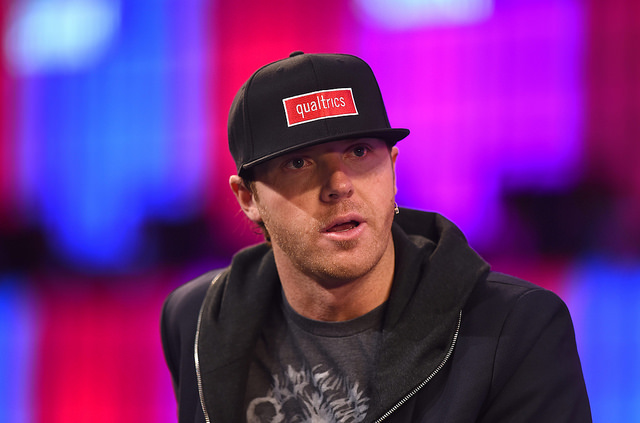Bootstrapped Unicorn: Qualtrics Founders Walk Away With $7 Billion
This week, Qualtrics International ditched its IPO plans and agreed to an $8 billion acquisition by SAP. Qualtrics was bootstrapped for ten years before it raised venture funding. With this acquisition, the founders and other major shareholders stand to make a cool $7 billion.

Photo Credit: Web Summit/Flickr.com
Qualtrics’ Journey
Provo, Utah-based Qualtrics was founded in 2002 by Scott Smith and his sons Ryan and Jared Smith. The idea behind Qualtrics came to Scott when he, a professor of marketing at Brigham Young University, realized the need to accelerate market research using the Web. He decided to work with college students to build an online survey software solution.
Initially, Qualtrics focused on an offering for graduate schools. It increased the sophistication of its surveys to address the needs of discerning doctoral researchers. Qualtrics used the tools developed for schools to gradually expand to the corporate marketing world. Soon Qualtrics became a software-as-a-service company and developed an insight platform. It simplifies and accelerates the process of capturing customer, employee, and market insights, and helps clients make informed business decisions.
Qualtrics’ flagship product is its customer experience management platform called XM Platform and Research on Demand solution. The XM platform is focused on measuring and analyzing customer, employee, brand, and product experience. Its Research on Demand solution is an automated, software-led approach that allows customers to gain market intelligence by procuring a curated group of respondents and returning tangible results while conforming to best-practice design and methodology.
As of September 30, 2018, Qualtrics had over 9,000 customers, including over 75% of the Fortune 100 and 30% of the 2018 Global 2000. Its customers include businesses of all sizes, academic institutions, and government organizations. As of June 30, 2018, its net retention rate was 122%.
Since opening its first international office in Dublin, Ireland in 2013, Qualtrics opened sales offices in nine countries including Australia, Canada, France, Germany, Ireland, Japan, Singapore, and the United Kingdom, along with the United States. Its international revenue represented 19%, 21%, and 22% of its total revenue in 2016, 2017 and the six months ended June 30, 2018, respectively.
Qualtrics’ Financials
In its IPO filing, Qualtrics reported revenue of $190.6 million in 2016 and $289.9 million in 2017, representing an annual growth rate of 52%. Its net loss was $12 million in 2016 and net income was $2.6 million in 2017. It has been free cash flow positive in every year since inception. It generated positive free cash flow of $3.4 million and $21.3 million in 2016 and 2017, respectively.
Qualtrics bootstrapped for the first ten years of its operations. In May 2012, the company finally accepted a $70 million in funding from Accel and Sequoia. In 2014, Qualtrics raised $150 million from Accel and Insight Venture Partners at a valuation of $1 billion. Qualtrics planned to use the funds toward market expansion to help grow revenues to north of $1 billion before going public. Last year, it raised $180 million at a valuation of $2.5 billion.
Qualtrics estimates its TAM to be $44 billion with XM becoming more critical than improving customer experience with CRM, more influential upon employee experience than HCM systems, and more important to enhancing brand experience than Marketing Automation. The acquisition is expected to catapult SAP’s revenue growth in the enterprise application software industry, where it competes with Salesforce and Oracle.
Qualtrics was set to raise about $500 million in an IPO that analysts estimate would have valued the company at least at $6 billion. The Smiths hold 87.6% of Qualtrics, which works out to about $7 billion of the $8 billion price.
Qualtrics is a wonderful example for startups. It has focused on its core fundamentals: customers, revenues, and profits. It was only after it became successful at that has it raised venture funding. It has gone to VCs as a king, not a beggar. And today, it’s delivered a win-win situation for all involved.



